Cats
Do Cats Like Garlic?
Harmful to cats, garlic is not a favorite – discover the dangers and symptoms of garlic poisoning in felines.
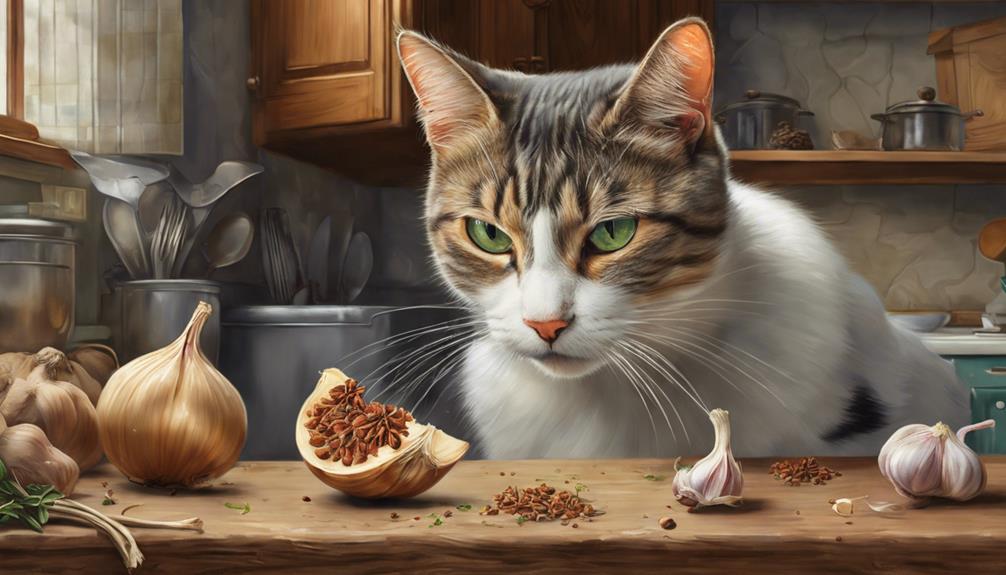
No, cats do not like garlic. It's harmful and even a tiny bit can be life-threatening, causing hemolytic anemia by destroying red blood cells. Symptoms of garlic poisoning in cats include vomiting, diarrhea, and breathing problems. Immediate vet care is essential if ingestion is suspected to prevent severe consequences. To keep cats safe, store allium vegetables away from them. Monitoring for symptoms and seeking veterinary aid for garlic poisoning is vital for a cat's well-being. Avoiding garlic in cat food and being cautious during meal prep can prevent accidental exposure. Remember, a cat's health comes first.
Key Takeaways
- Cats do not like garlic; they are not attracted to the taste.
- Garlic is harmful to cats and should be avoided in their diet.
- Ingesting garlic can lead to severe health issues and even be life-threatening for cats.
- Cats have a sensitive digestive system that cannot tolerate garlic.
- It's essential to keep garlic and other Allium family vegetables away from cats to prevent poisoning.
Garlic Toxicity in Cats
Garlic is considered toxic to cats due to its sulfur-containing compounds that can destroy their red blood cells. Cats are more sensitive to garlic toxicity compared to other animals, making it important to be mindful of what they ingest.
If Cats Eat Garlic, it can lead to severe consequences. Ingesting garlic can result in hemolytic anemia in cats, causing symptoms such as weakness and vomiting. It's important to be vigilant about keeping garlic, along with other Allium family vegetables like onions, leeks, chives, and shallots, away from your feline companions. Even small amounts can be harmful and potentially life-threatening to cats.
If you suspect that your cat has ingested garlic, immediate veterinary care is necessary. Prompt treatment can help prevent further complications such as organ damage or even death. Remember, when it comes to garlic and cats, prevention is key to ensuring their well-being and health.
Harmful Effects of Garlic
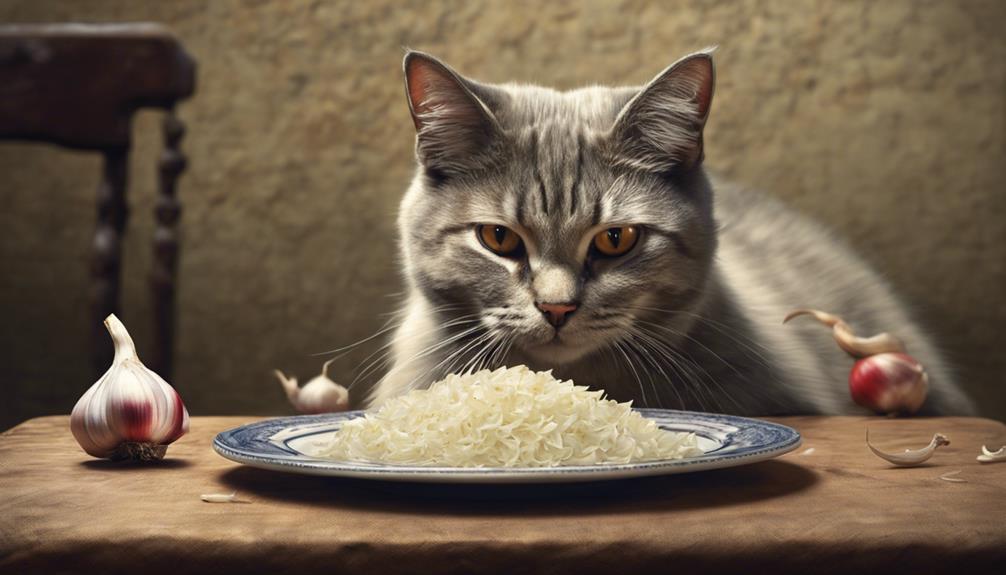
Paying close attention to what our feline companions consume is vital, especially when considering the harmful effects of certain foods like garlic on their health. Garlic contains sulfur-containing compounds that can be particularly harmful to cats, leading to the destruction of red blood cells and the development of hemolytic anemia. Even a small amount of garlic can have severe consequences, possibly causing organ damage or even death in our beloved pets. It's essential to be aware that garlic, along with other allium family vegetables such as onions, shallots, leeks, chives, and scallions, should be strictly avoided in a cat's diet.
The impact of garlic on cats can be devastating, with symptoms of toxicity appearing a few days after ingestion. Understanding the dangers associated with garlic consumption can help prevent unnecessary harm to our feline friends. If you suspect that your cat has ingested garlic, immediate veterinary attention is crucial to prevent any further complications that may arise. Remember, cautiousness in what our cats eat can greatly contribute to their overall health and well-being.
Symptoms of Garlic Poisoning

Garlic poisoning in cats can lead to various symptoms such as vomiting, diarrhea, and breathing difficulties. Additionally, cats exposed to garlic may show signs like increased respiratory and heart rates, pale gums, and potential collapse.
Diagnosis of garlic toxicity can be challenging due to the delayed onset of symptoms, typically appearing 2-4 days after ingestion.
Garlic Toxicity in Cats
Exposure to garlic can induce a range of symptoms in cats, signaling potential poisoning that demands prompt attention. Garlic toxicity in cats can manifest through vomiting, diarrhea, fatigue, and breathing difficulties. If a cat has ingested garlic, it may exhibit increased respiratory and heart rates, pale gums, and even potential collapse.
To diagnose garlic poisoning, veterinarians may conduct tests such as a complete blood count, urinalysis, and blood chemistry. The presence of Heinz bodies in the blood could indicate anemia resulting from garlic ingestion.
Treatment for garlic poisoning in cats may involve inducing vomiting, gastric lavage, administering activated charcoal, and monitoring for IV fluids or oxygen therapy. Being aware of these symptoms and seeking immediate veterinary care is essential in ensuring a cat's well-being.
Emergency Treatment Options
When dealing with symptoms of garlic poisoning in cats, immediate veterinary intervention is vital for ensuring the best possible outcome.
If your feline friend shows signs like vomiting, diarrhea, fatigue, breathing difficulties, or pale gums, don't hesitate – seek emergency treatment right away.
Increased respiratory and heart rates, along with collapse, are common indicators of garlic poisoning in cats. Since diagnosis can be tricky due to delayed symptoms, it's important to monitor for subtle signs like pale gums and rapid breathing.
Long-term Health Implications
To address the long-term health implications of garlic poisoning in cats, vigilant monitoring for symptoms is essential for prompt intervention and treatment. Garlic poisoning can lead to serious consequences in cats, such as anemia, organ damage, and even death if left untreated. Symptoms of garlic poisoning in cats may present as gastrointestinal upset, weakness, yellowing of the skin, and changes in vital signs.
Chronic exposure to garlic can cause cumulative damage to red blood cells, worsening anemia over time. Due to the delayed onset of symptoms, closely monitoring your cat for any signs of poisoning is critical. Remember, seeking veterinary help and providing supportive care are crucial in addressing the long-term effects of garlic poisoning in cats.
Immediate Veterinary Help Needed
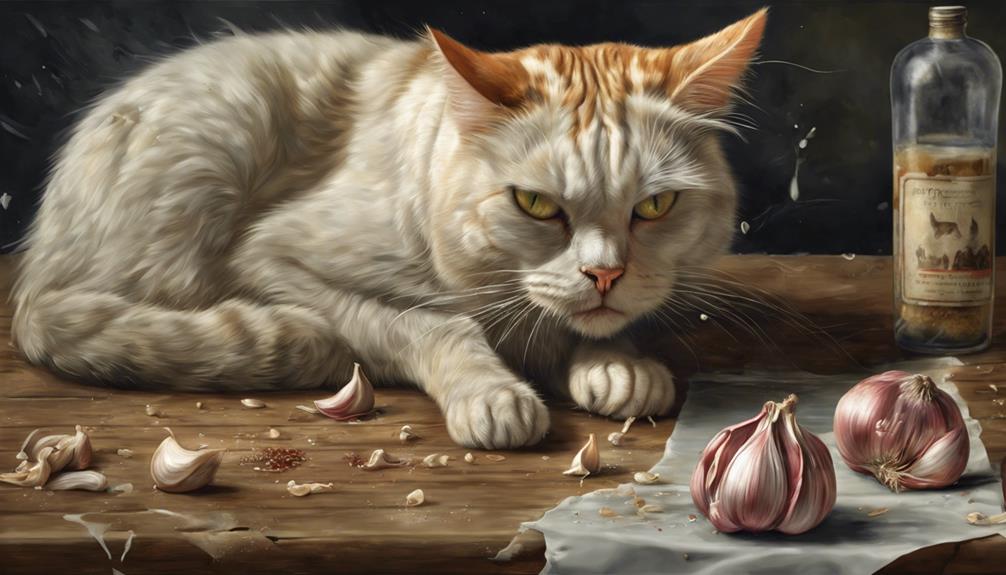
Seek immediate veterinary assistance if your cat has ingested garlic to address the potential toxic effects and prevent serious health complications. Garlic can be highly toxic to cats, leading to severe poisoning that can damage their red blood cells and even cause organ failure. If you notice symptoms like vomiting, diarrhea, weakness, or pale gums in your cat, don't hesitate to contact a veterinarian promptly for evaluation and treatment. Timely diagnosis and intervention are vital in managing garlic toxicity to avoid any long-term harm to your furry companion.
Immediate veterinary care is essential to counteract the toxic effects of garlic ingestion.
Prompt treatment can help prevent severe complications such as organ failure.
Your quick action can make a significant difference in your cat's recovery and overall well-being.
Preventing Garlic Poisoning in Cats

After addressing the immediate need for veterinary assistance in cases of garlic ingestion, the focus shifts to preventing garlic poisoning in cats. As pet owners, it's essential to be proactive in safeguarding our feline friends from the harmful effects of garlic. This means being mindful of where we store allium family vegetables, like garlic, to make certain they're out of reach of curious whiskers.
Educating those around us about the dangers of garlic for cats can also play a significant role in prevention. By raising awareness about the risks associated with garlic ingestion, we can help create a safer environment for our beloved pets. Additionally, regularly checking the ingredients in our cat's food and treats is vital to guarantee they're free of garlic, minimizing the chances of accidental poisoning.
Being vigilant during meal preparation is another key step in preventing garlic exposure to our cats. By paying close attention to ingredients and taking necessary precautions, we can help keep our furry companions safe from the potential dangers garlic poses to their health and well-being.
Allium Family Foods to Avoid

When it comes to our feline friends, it's important to steer clear of allium family foods like garlic, onions, shallots, leeks, chives, and scallions. These ingredients contain harmful compounds that can lead to red blood cell destruction and life-threatening anemia in cats.
Remember to be cautious with dishes like salads and casseroles that might contain these toxic vegetables when around your furry companions.
Garlic and Cats
Garlic and other allium family foods are harmful to cats and should be strictly avoided due to their potential to damage red blood cells. Cats' bodies react differently to certain foods, and garlic is one of those foods that can pose serious risks to our feline friends. Here are some key points to remember:
- Ingesting garlic can induce vomiting in cats, signaling their bodies' rejection of the harmful substance.
- The sulfur compounds in garlic can cause severe damage to red blood cells in cats, leading to anemia.
- Even a small amount of garlic can have detrimental effects on a cat's health, so it's essential to keep allium family foods away from them.
- If you suspect your cat has consumed garlic or any other toxic food, seek immediate veterinary care to prevent further complications.
Toxic Allium Foods
As responsible cat owners, we must be aware of the toxic allium family foods that can be harmful to our feline companions. Garlic is toxic to cats, along with other members of the allium family like onions, shallots, leeks, chives, and scallions. These vegetables contain compounds that can lead to red blood cell destruction in cats.
Even a small amount of garlic or any other allium family food can cause life-threatening anemia in our beloved pets. It's essential to make sure that our cats never consume any of these toxic vegetables to prevent poisoning symptoms. Being vigilant and keeping these harmful foods out of reach is vital for the well-being of our furry friends.
Pet Safety Tips
Aware of the dangers that toxic allium family foods pose to our feline companions, it's important to prioritize pet safety by avoiding garlic and other related vegetables in a cat's diet. When it comes to pet health, keeping garlic and onions away from your cat is vital.
Remember, these seemingly harmless ingredients can have severe consequences on your furry friend's well-being. Always double-check labels and ingredients to safeguard your cat's diet.
In case of accidental ingestion, contact the ASPCA Animal Poison Control immediately for guidance and seek veterinary care without delay. Your cat's health is paramount, and being proactive in preventing exposure to harmful substances like garlic and onions is a simple yet effective way to guarantee their safety.
Garlic Vs. Onions for Cats
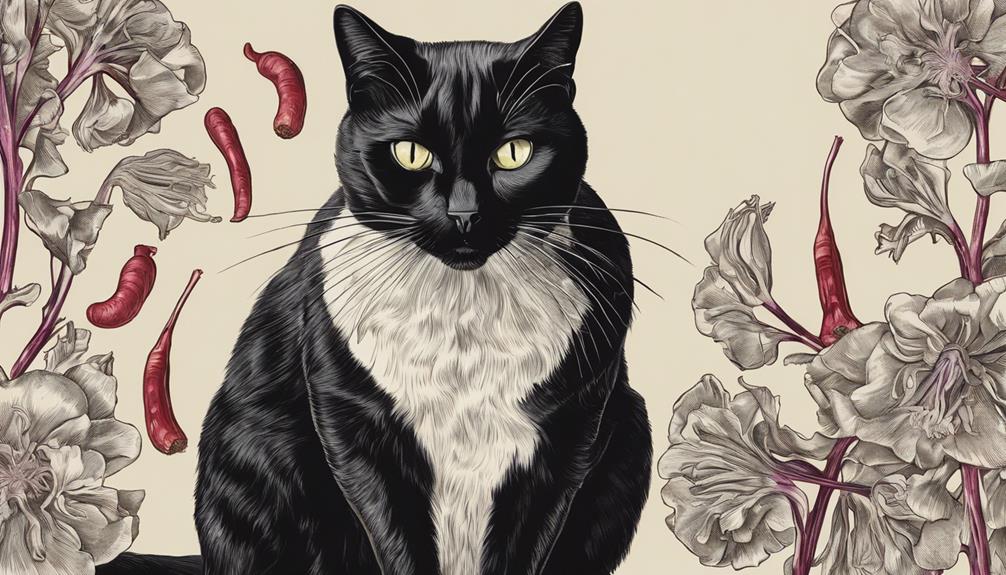
While both garlic and onions are harmful to cats, garlic poses a greater toxicity risk compared to onions. Cats are more sensitive to garlic toxicity, with garlic being 3-5 times more toxic to them than onions.
Both garlic and onions belong to the Allium family, containing compounds that can damage the small red blood cells in animals. When ingested, these vegetables can lead to a severe condition called hemolytic anemia in cats, which can be life-threatening.
It's essential for cat owners to be aware of the dangers of feeding their feline companions any foods containing garlic or onions to prevent toxicity. Even small amounts of garlic or onion can have detrimental effects on a cat's health, so it's best to avoid these ingredients entirely in their diet.
Prioritizing the well-being of our beloved pets means steering clear of these harmful substances and opting for safer food options instead.
Diagnosing Garlic Poisoning
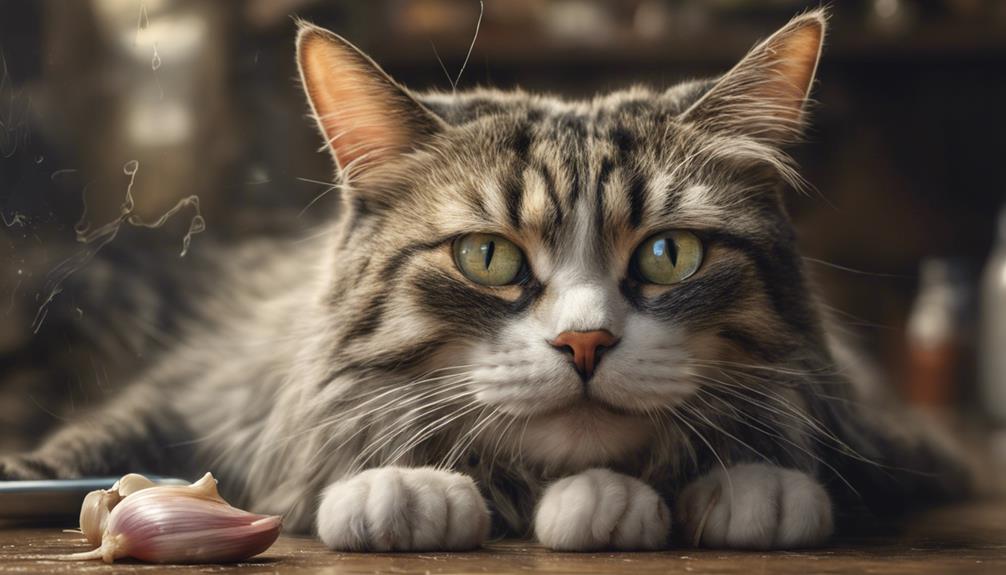
Upon noticing symptoms such as vomiting, diarrhea, fatigue, and breathing difficulties in a cat, diagnosing garlic poisoning becomes essential through specific tests and evaluations. When faced with the possibility of garlic poisoning in our feline companions, emotions can run high. It's vital to approach the diagnosis with care and attention.
- Vomiting: Witnessing our cat experiencing vomiting can be distressing, signaling a potential issue that requires prompt attention.
- Diarrhea: Dealing with a cat suffering from diarrhea can be messy and concerning, highlighting the urgency of determining the cause.
- Heinz bodies: The presence of Heinz bodies in blood samples indicates a serious condition, underscoring the need for accurate diagnosis and treatment.
- Anemia: Anemia resulting from garlic ingestion can have severe consequences, emphasizing the importance of swift and effective intervention.
These symptoms serve as vital indicators, guiding us in the diagnosis and management of garlic poisoning in our beloved feline friends.
Treating Garlic Poisoning
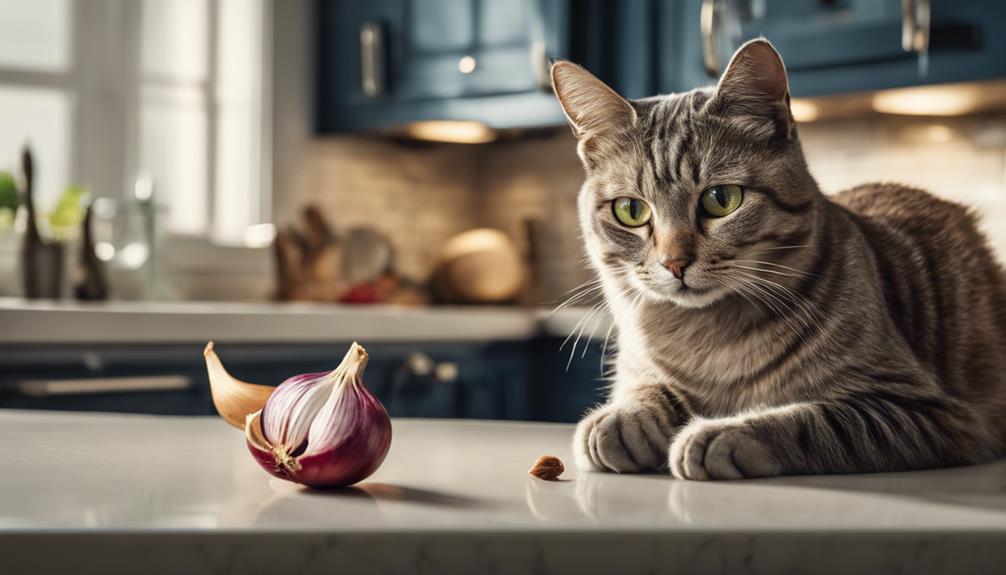
After diagnosing garlic poisoning in a cat, the next step involves determining the appropriate treatment methods to alleviate the effects of the toxin. If your feline friend has ingested garlic, inducing vomiting may be necessary to expel the toxin from their stomach. Veterinarians might also perform gastric lavage to effectively remove the garlic from their system.
Administering activated charcoal can help absorb the toxins and prevent further harm. In severe cases, cats may need close monitoring, IV fluids to stay hydrated, oxygen therapy for respiratory support, and in extreme situations, a blood transfusion may be necessary. These interventions aim to support your cat's recovery and minimize the impact of garlic poisoning.
Other Potential Cat Poisonings
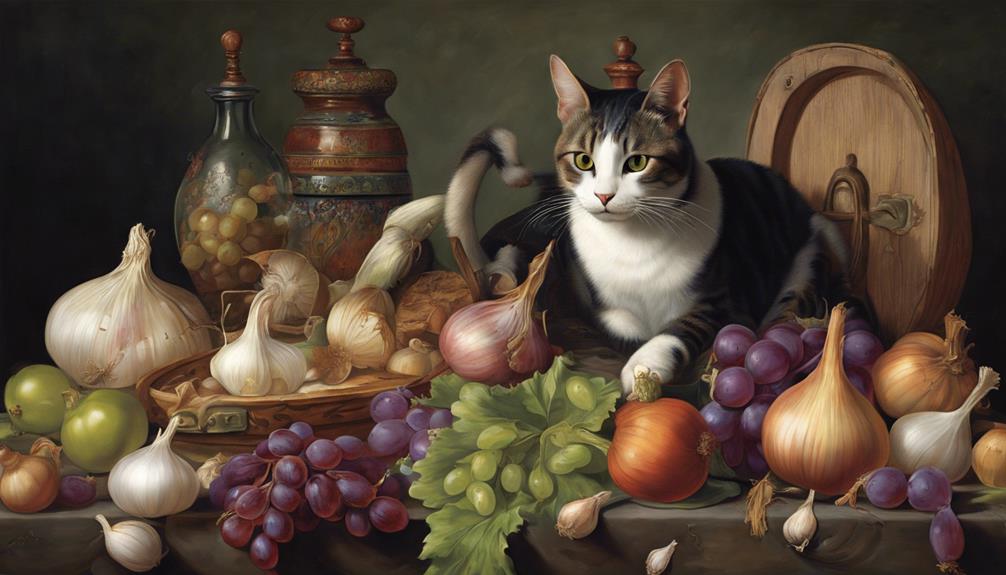
To protect our feline friends' well-being, it's essential to be diligent about potential poisonings other than garlic and onion. When it comes to keeping our cats safe from accidental ingestions, we must be vigilant in all areas of their environment. Here are some other substances to watch out for:
- Lilies: These beautiful flowers can be deadly to cats if ingested.
- Grapes and Raisins: These common snacks for humans can cause kidney failure in cats.
- Xylitol: This sweetener found in gum and sugar-free products can be toxic to our furry companions.
- Medications: Human medications, even in small amounts, can be harmful to cats.
Safe Human Foods for Cats
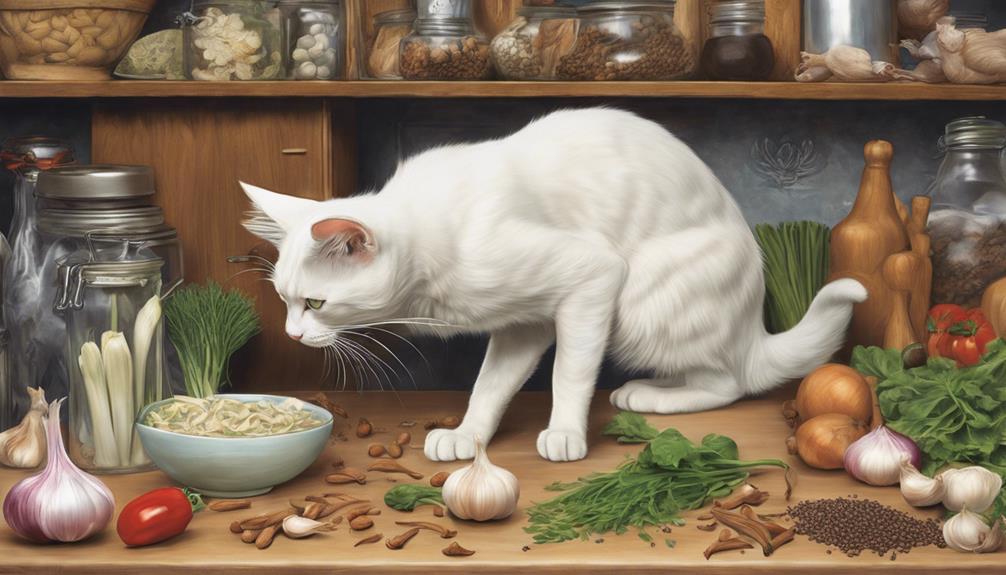
What human foods are safe for cats to eat? It's vital to provide our feline friends with nutritious and safe options.
When it comes to including safe human foods in your cat's diet, opt for unseasoned cooked meats like chicken, turkey, and salmon. These protein sources can be a tasty addition to their meals. However, remember that treats should only make up a small portion, no more than 10%, of your cats' daily diet to make certain they receive a balanced nutrition.
It's important to steer clear of foods seasoned with garlic, chives, or other Allium family members as they can be harmful to cats. To make sure that the treats you offer are safe, consult with a veterinarian for guidance and verify they're garlic-free.
Herbs Safe for Cats
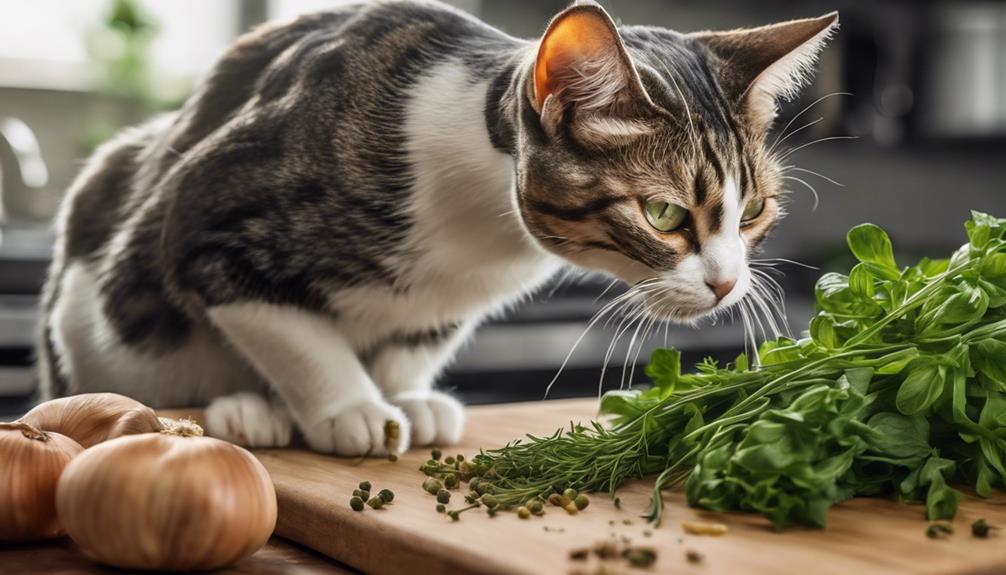
Herbs like catnip, cat thyme, and cat grass are safe and enjoyable options for cats. These herbs not only provide a safe way to enrich your cat's environment but also offer mental stimulation that can keep your feline friend entertained.
- Catnip: Known for its euphoric effects on cats, catnip can be a fun way to interact with your furry companion.
- Cat Thyme: This herb, similar to catnip, can also induce playful behavior in cats, making it a favorite among many feline friends.
- Cat Grass: Cats often enjoy nibbling on cat grass, which can aid in digestion and provide essential nutrients.
- Mint, Parsley, and Basil: While garlic, chives, and onions are toxic to cats, herbs like mint, parsley, and basil can be safe in small quantities, adding variety to their diet.
Houseplants Safe for Cats
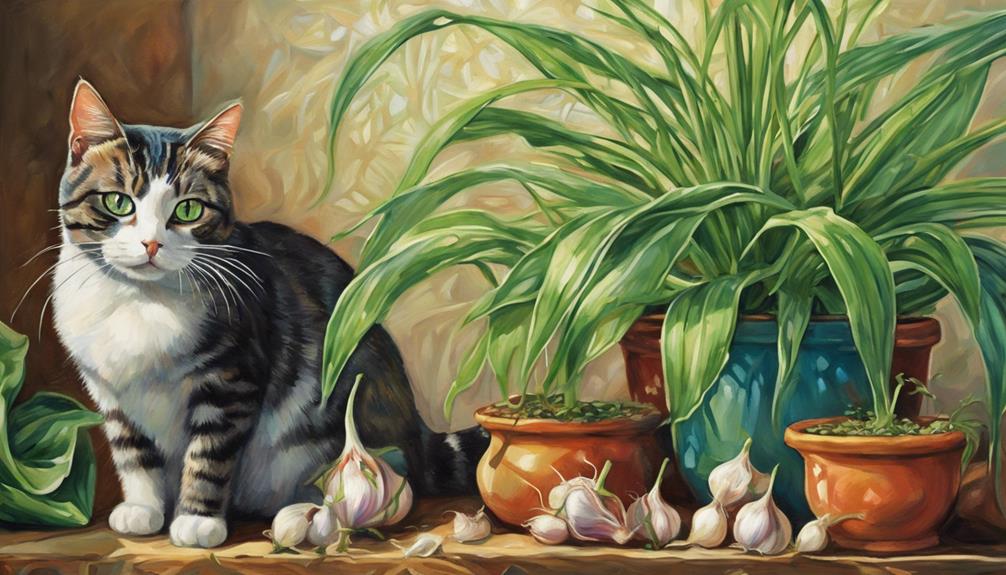
When selecting houseplants for a cat-friendly environment, consider options like spider plants, Boston ferns, and African violets, which are known to be safe for feline companions. Keep in mind that some houseplants can be toxic if a curious cat consumes them.
Catnip, mint, and cat grass aren't only safe but can also provide enrichment for your beloved furry friends. It's essential to avoid toxic plants like lilies, aloe vera, and philodendrons in homes with cats to prevent any accidental ingestion that could lead to your cat suffering.
Safe houseplants not only improve indoor air quality but also create a stimulating environment for your cats to explore. Researching cat-safe plants and ensuring they receive proper care can help you cultivate a pet-friendly living space that's both beautiful and safe for your feline companions.
Trust us, your cats will thank you for creating a space where they can roam and play freely without any hidden dangers lurking in the leaves.
Anemia in Cats: Causes & Prevention
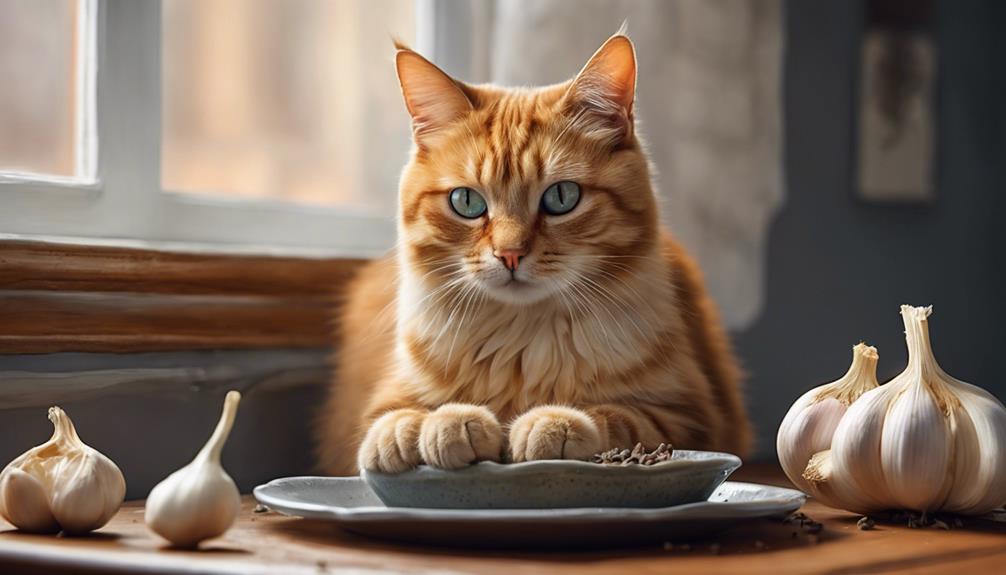
To prevent anemia in cats, it's crucial to avoid feeding them garlic or any garlic-containing products, as consumption of garlic can harm red blood cells, leading to serious health complications and even death if left untreated. Anemia in cats can show through symptoms like weakness, pale gums, and increased respiratory rates. Preventing anemia involves being mindful of what we feed our feline companions.
- Avoid Garlic: Refrain from giving cats any food containing garlic to protect their red blood cells.
- Watch for Symptoms: Keep an eye out for signs of anemia like weakness and pale gums to address the issue promptly.
- Regular Vet Visits: Scheduled veterinary check-ups can help monitor your cat's red blood cell levels and catch any concerns early.
- Health First: Prioritize your cat's health by steering clear of garlic and promptly addressing any symptoms of anemia.
Garlic Poisoning Management
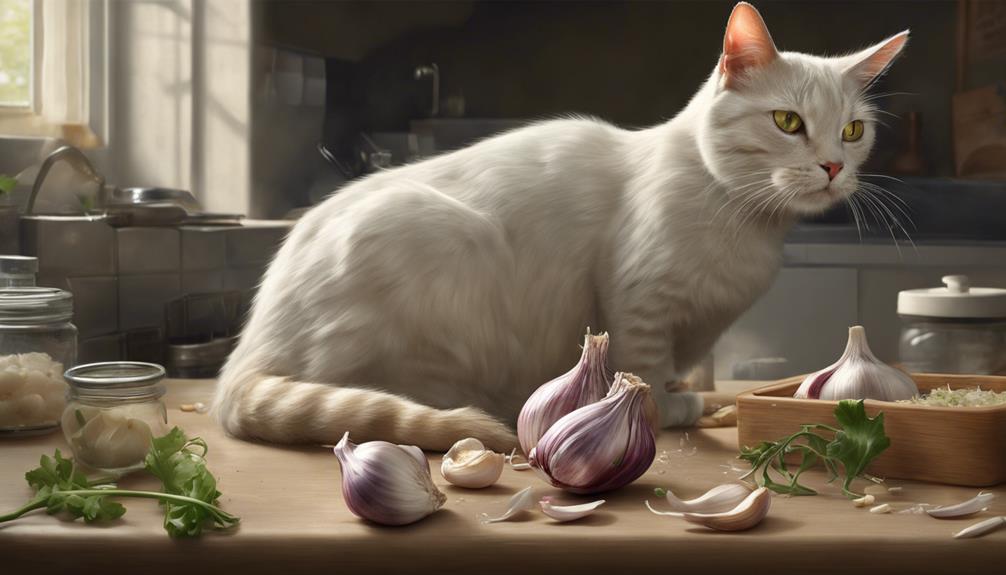
In managing cases of garlic poisoning in cats, immediate veterinary attention is essential to prevent severe complications and guarantee prompt treatment. If your feline friend has ingested garlic, it's crucial to seek professional help right away. Diagnosis typically involves evaluating the history of ingestion, observing clinical signs, and conducting blood sample examinations.
Treatment options may include inducing vomiting, administering activated charcoal, providing intravenous fluids, and in severe cases, a blood transfusion might be necessary. With proper care and monitoring, cats can recover from mild cases of garlic ingestion.
Frequently Asked Questions
Do Cats Like the Smell of Garlic?
It is common knowledge that cats generally dislike the smell of garlic. Their sensitive noses and aversion to strong scents make it unappealing. The sulfur compounds in garlic emit a pungent odor that can repel cats.
What Happens if Cat Licks Garlic?
If a cat licks garlic, it can suffer gastrointestinal upset and toxicity. Immediate symptoms may not show, but long-term harm is possible. We must prevent cats from ingesting garlic to safeguard their health.
Why Does My Cat Like to Eat Garlic?
My cat's interest in garlic could be due to curiosity or hunger, but feeding them garlic is dangerous. Cats don't naturally like garlic, and it's toxic to them. We should discourage this behavior to keep them safe.
Can Cats Eat Meat Seasoned With Garlic?
Sure, cats should avoid meat seasoned with garlic as they dislike the taste and smell of it. Choosing to skip garlic when preparing their meals helps maintain their appetite and health, ensuring they enjoy their food.
Conclusion
To sum up, remember, garlic and cats just don't mix! Keep your feline friends safe by avoiding this pungent plant in their diet.
Opt for herbs and houseplants that are kitty-friendly to prevent any potential health risks. Anemia in cats is no joke, so let's steer clear of garlic and keep our furry companions happy and healthy.
Remember, when it comes to garlic and cats, it's better to be safe than sorry!
Paul’s love for animals knows no bounds. As a dedicated writer and animal lover, Paul brings a unique perspective to our team. His firsthand experiences with various animals enrich our content and provide valuable insights into their behavior and needs. Whether he’s sharing tips for pet care or shedding light on pressing conservation issues, Paul’s passion for animals shines through in everything he does.
Cats
Hairball Treatment for Cats: The Ultimate Guide
Uncover the best strategies to tackle hairballs in cats, ensuring your feline companion stays happy and healthy – discover more in our comprehensive guide!
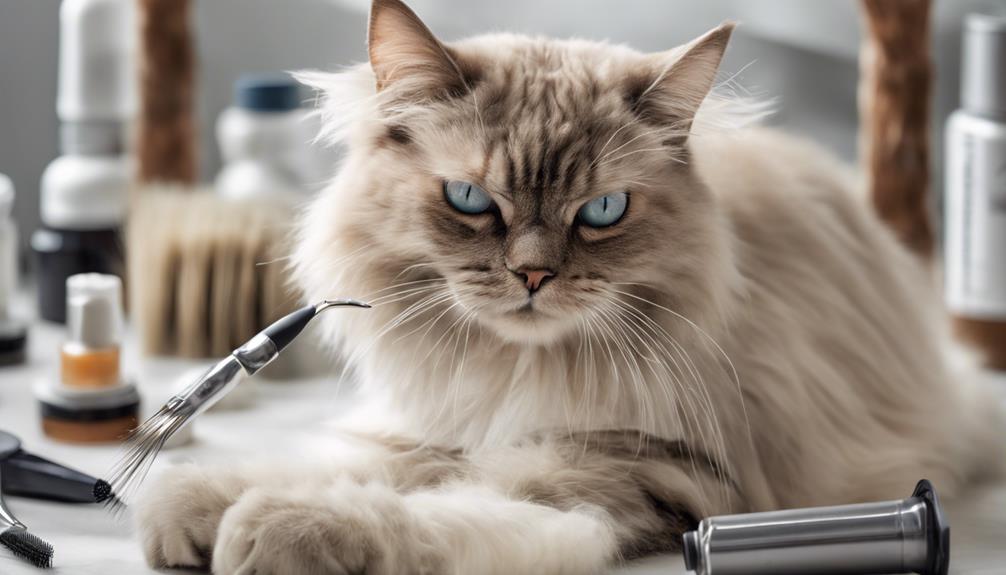
Dealing with cat hairballs? Causes include loose fur ingestion, barbed tongues, and long-haired cats. Symptoms like hacking, retching, and lethargy signal hairball issues. Treat with gels, high-fiber supplements, and vet consultation. Watch for coughing, bloating, or unusual tiredness, needing immediate vet care. Home remedies like pumpkin puree and probiotics aid relief. Prevent with hydration, grooming, fiber-rich diets, and specialized food. Seek vet help for severe symptoms or changes in behavior. Try fish oil, cat grass, and coconut oil as natural remedies. Stay informed for better cat care. More insights await in our comprehensive guide.
Key Takeaways
- Use hairball-control gels and high-fiber supplements.
- Consider fiber-loaded treats and specialized cat food.
- Consult a vet for persistent hairballs or symptoms.
- Maintain a healthy digestive system with dietary changes.
- Incorporate natural remedies like pumpkin puree and probiotics.
Causes of Cat Hairballs
Hairballs in cats often result from ingesting loose fur during grooming. Cats have a barbed tongue that catches loose hair while grooming, leading to the ingestion of this hair.
Long-haired cats and breeds that shed excessively are more prone to hairballs as they tend to ingest more fur during grooming sessions. The hair forms a mass in the digestive tract, causing irritation and blockages. As cats can't digest hair, it accumulates in their stomach and intestines, forming the hairball.
Ensuring that your cat has enough fiber in their diet can help move the hair through their system more effectively. Additionally, providing specialized cat foods designed to reduce hairball formation can be beneficial.
Regular grooming not only keeps your cat's coat in good condition but also helps minimize the amount of loose hair they ingest, ultimately reducing the risk of hairball formation.
Symptoms to Watch For
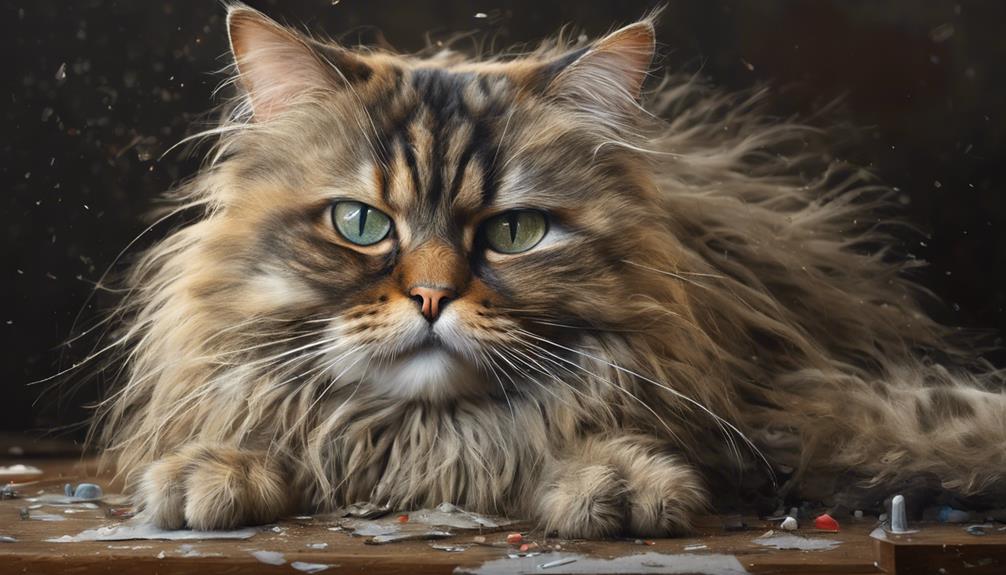
When it comes to our feline friends, keeping an eye out for common signs of hairballs is crucial. Watch for symptoms like hacking, gagging, and retching, as they could indicate your cat is struggling with hairball issues.
If your cat is showing persistent vomiting without expelling a hairball, it might be a red flag for a more serious underlying problem that requires prompt attention.
Common Signs of Hairballs
Experiencing frequent episodes of hacking and gagging could indicate that your cat is struggling with hairballs. These common signs of hairballs, such as retching and persistent vomiting without expelling a hairball, are important symptoms to watch for.
If your cat shows a lack of appetite, seems lethargic, or experiences digestive problems like constipation or diarrhea, hairballs could be the culprit. Keep an eye out for severe symptoms like a bloated abdomen or life-threatening blockages, as these indicate a serious hairball issue that needs immediate attention.
Understanding these hairball symptoms is crucial for effective hairball management and treatment. Remember, prevention and timely intervention play key roles in keeping your feline friend healthy and happy.
Behavioral Changes in Cats
Behavioral changes in cats, such as increased grooming or obsessive licking, may indicate potential hairball issues that require attention. Cats experiencing hairball problems may show signs of discomfort, like changes in appetite or refusal to eat. Additionally, avoidance of activities or hiding behavior could signal distress due to hairballs.
If your cat starts exhibiting excessive meowing, pacing, or seeking solitude, it might be struggling with hairball troubles. Keeping an eye out for these behavioral changes can help you identify and address hairball issues promptly, ensuring your feline friend stays happy and healthy. Remember, early detection and intervention are key in managing hairballs effectively. Be attentive to your cat's behaviors to provide the care they need.
Effective Treatment Options
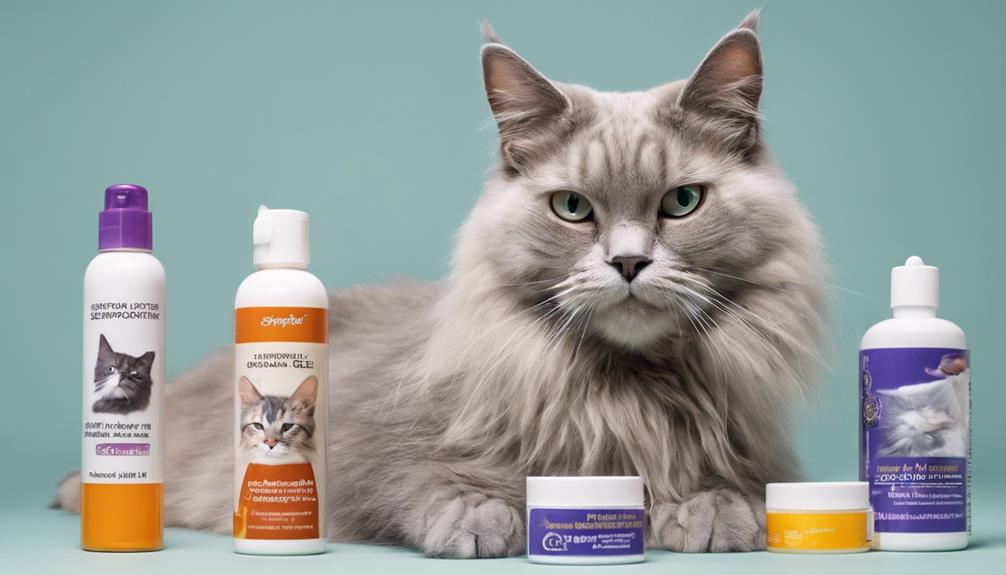
To effectively address hairball issues in cats, considering various treatment options is essential. Hairball-control gels, like Laxatone, act as lubricants to help cats pass hairballs more easily. High-fiber supplements can aid in sweeping hair through the digestive system, reducing hairball formation.
Cats may enjoy fiber-loaded treats, which not only manage hairballs but also serve as a tasty solution. Switching to high-fiber cat food is another effective way to control and prevent hairballs in cats. If your feline companion experiences frequent hairballs or related symptoms, consulting a vet is crucial for proper treatment.
These options provide practical ways to address hairball concerns and ensure your cat's well-being. By incorporating these treatments into your cat's routine, you can help them maintain a healthy digestive system and minimize the discomfort associated with hairballs.
Veterinary Intervention Indicators
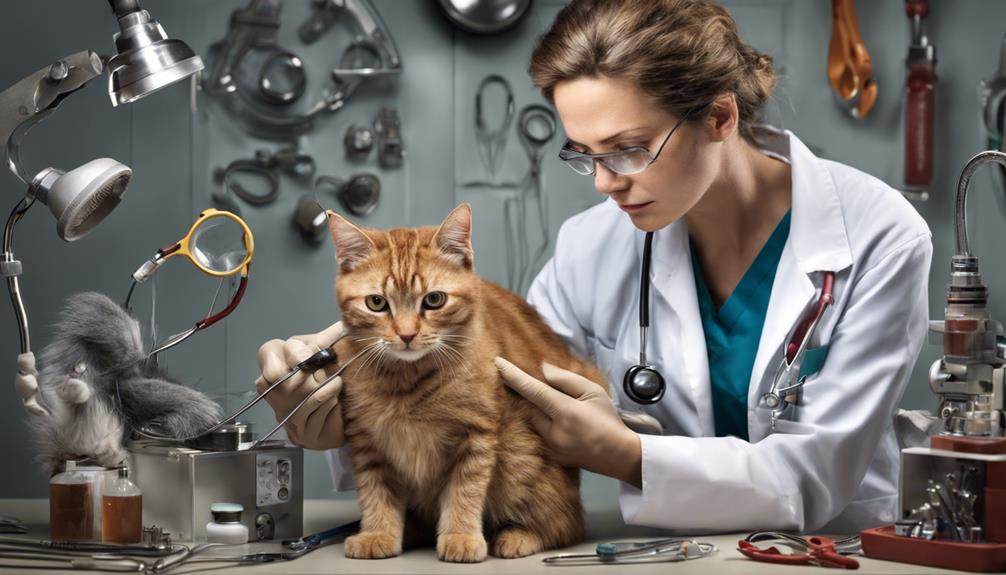
Upon observing persistent vomiting without hairball expulsion in cats, it becomes evident that veterinary intervention may be necessary to address potential underlying issues. Some indicators that your feline friend may need professional assessment include:
- Coughing: Persistent coughing alongside hairball issues could point to a more serious condition.
- Constipation or Diarrhea: These symptoms may signal an obstruction or gastrointestinal problem.
- Bloated Abdomen: A distended belly in conjunction with hairball troubles may require immediate attention.
- Lethargy: Unusual tiredness beyond normal hairball discomfort might indicate a more significant problem.
- Loss of Appetite or Difficulty Drinking: These signs could suggest an urgent need for veterinary care in hairball-related cases.
Home Remedies for Relief
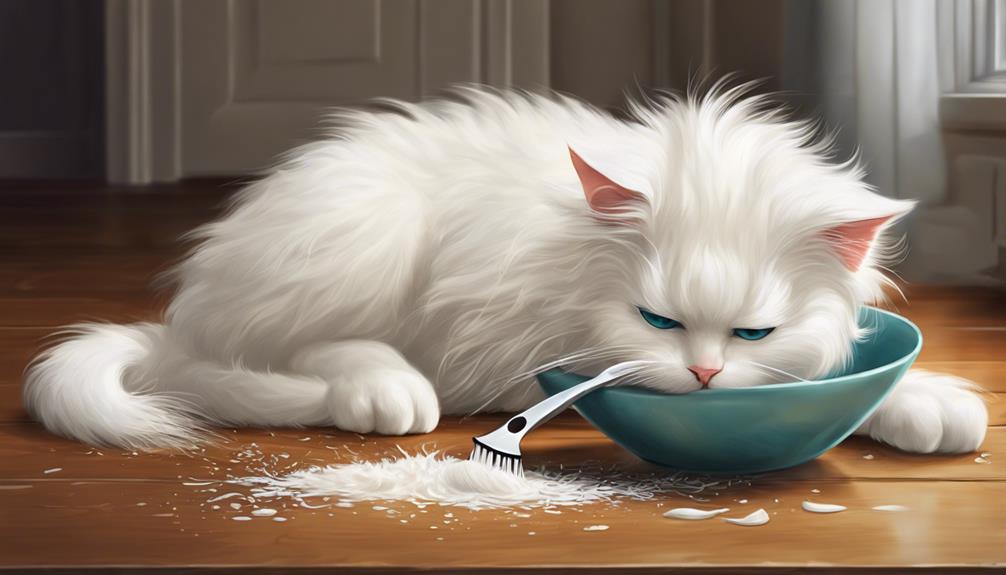
When looking for ways to help your cat with hairball troubles, consider natural remedies like:
- Pumpkin puree
- Cat grass
- Coconut oil
- Probiotics
These options can aid in digestion, induce vomiting to eliminate hairballs, act as a natural lubricant, and promote gut health to reduce hairball formation.
Additionally, incorporating hairball-control treats with natural ingredients into your cat's diet regularly can help manage and prevent hairballs effectively.
Natural Hairball Remedies
Exploring natural hairball remedies offers cat owners effective ways to alleviate their feline companions' discomfort and promote digestive health. Here are some simple remedies to help your cat with hairball issues:
- Pumpkin Puree: Aids digestion and helps hair pass through the digestive tract.
- Coconut Oil: Acts as a natural lubricant to ease the passage of hairballs.
- Plain Yogurt: Introduces beneficial bacteria to aid in digestion and reduce hairball formation.
- Olive Oil: Helps lubricate the digestive system, facilitating the elimination of hairballs.
- Grass or Catnip: Encourages natural vomiting to expel hairballs and promote digestive health.
These remedies can provide relief and support your cat's overall well-being.
Effective Dietary Changes
What dietary changes can help provide relief for cats suffering from hairball issues at home? Introducing high-fiber cat food aids in hairball digestion, while specialized diets recommended by veterinarians can target specific needs. Wet diets or canned food increase moisture content in the digestive system, promoting hairball passage. Hairball-control treats with added fiber offer digestive support for your feline companion. For tailored advice, consult with a vet for personalized dietary recommendations. To help you visualize the options available, we've compiled a table below:
| Dietary Changes | Benefits | Recommended Options |
|---|---|---|
| High-fiber cat food | Aids in hairball digestion | Quality brands |
| Specialized diets | Target specific needs | Vet-recommended options |
| Wet diets | Increases moisture content | Canned food varieties |
| Hairball-control treats | Offers digestive support | Fiber-enriched treats |
| Added fiber | Improves digestion | Supplements |
Preventing Future Hairball Issues

To prevent future hairball issues in your cat, regularly brushing their fur is essential to reduce loose hair and minimize hairball formation. Brushing not only helps in maintaining a healthy coat but also prevents excessive shedding, which can lead to hairballs.
Additionally, consider the following tips to further prevent hairball problems:
- Provide a high-fiber diet: A diet rich in fiber aids in moving hair through the digestive system, reducing the likelihood of hairballs.
- Use hairball-control products: Gels, treats, or supplements specifically designed to help with hairball prevention can be beneficial.
- Encourage hydration: Ensure your cat has access to fresh water at all times to support digestion and help prevent hairballs.
- Consult with a veterinarian: Seek personalized advice from a vet on the best hairball prevention strategies tailored to your cat's specific needs.
- Stay consistent with grooming: Regular cat grooming not only keeps their coat healthy but also reduces the amount of loose fur that can contribute to hairballs.
Frequently Asked Questions
What Is the Best Treatment for Hairballs in Cats?
For hairballs in cats, the best treatment involves specialized cat foods, hairball gels, regular grooming, and high-fiber supplements. These options help prevent hairball formation and aid in their passage through the digestive system.
How Do You Get a Cat to Pass a Hairball?
To help our cat pass a hairball, we encourage grooming, offer hairball control treats, increase fiber intake, keep them hydrated, and monitor behavior. If issues persist, we seek veterinary advice promptly for our furry friend's well-being.
What if My Cat's Hairball Won't Come Up?
When a cat's hairball won't come up, it's vital to act swiftly. Excessive efforts can lead to serious issues like choking. Urgent veterinary care is crucial, offering options like sedation or surgery for non-passable hairballs.
Does Vaseline Help Cats With Hairballs?
No, Vaseline doesn't help cats with hairballs. It can be harmful if ingested, leading to health issues. Safer options like hairball-control gels or high-fiber diets are recommended. Consult a vet for the best advice.
Conclusion
In conclusion, hairballs are a common issue for cats that can be easily managed with proper treatment and prevention.
Did you know that on average, a cat will produce one hairball every 1-2 weeks?
By recognizing the causes, symptoms, and treatment options, you can help your feline friend stay healthy and comfortable.
Remember to consult with your veterinarian for any concerns and try out some of the home remedies to provide relief for your cat.
Paul’s love for animals knows no bounds. As a dedicated writer and animal lover, Paul brings a unique perspective to our team. His firsthand experiences with various animals enrich our content and provide valuable insights into their behavior and needs. Whether he’s sharing tips for pet care or shedding light on pressing conservation issues, Paul’s passion for animals shines through in everything he does.
Cats
Can Cats Eat Tuna in Oil Safely?
Pondering if tuna in oil is safe for cats? Dive into the risks and benefits to ensure your feline's well-being.
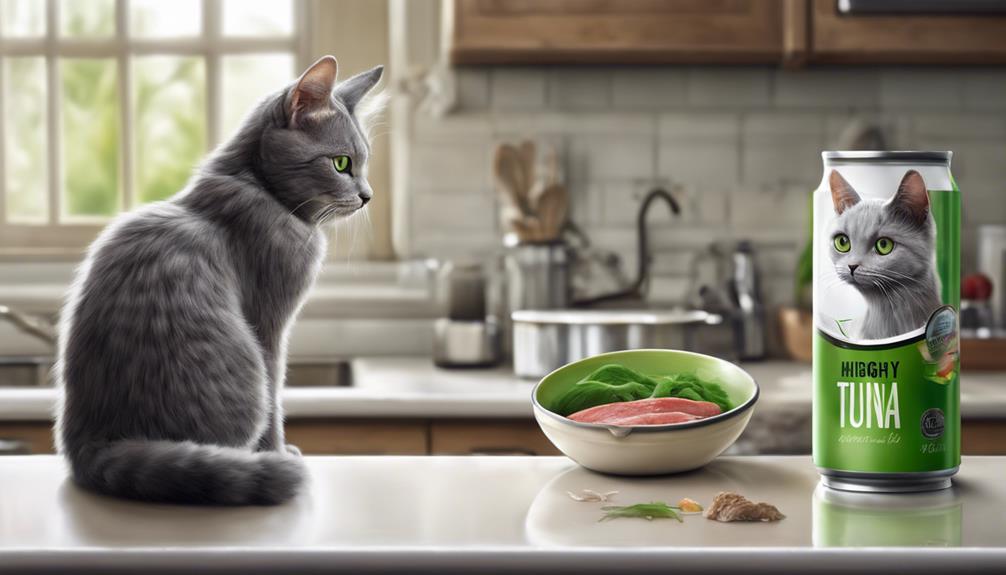
Cats can eat tuna in oil, but it may not be the safest choice. The high fat content in oil-packed tuna can lead to obesity and digestion problems. Opt for tuna in water for a better alternative. While tuna does offer nutritional value, moderation is key. Watch for signs of mercury poisoning, especially with excessive consumption. Consider age-appropriate portions, and consult a vet for dietary advice. Safeguard your cat's health by prioritizing a balanced diet. Remember, a healthy feline diet goes beyond just tuna. Your cat's well-being is paramount. More insights on feline nutrition await.
Key Takeaways
- Tuna in oil can harm cats' digestive systems due to high fat content.
- Opt for tuna in water for safer consumption.
- Excessive tuna in oil can lead to obesity and digestive issues.
- Monitor for signs of mercury poisoning from tuna.
- Consult a vet for advice on a balanced diet for cats.
Risks of Tuna in Oil for Cats
When feeding our feline friends, it's crucial to be aware of the risks associated with giving them tuna in oil. Cats are known for their love of fish, but when it comes to tuna, we need to be cautious. Tuna in oil can be harmful to our cats' delicate digestive systems. The high calorie and fat content in oil-packed tuna can lead to obesity and gastrointestinal issues in our furry companions. It's essential to consider the impact of their diet on their overall health and well-being.
Feeding our cats tuna in oil may seem like a tasty treat for them, but the potential risks outweigh the momentary pleasure. To ensure the safety of our cats' diet, opt for tuna in water instead. This small adjustment can make a significant difference in preventing unwanted health issues in our beloved feline friends. Let's prioritize our cats' health by making informed choices when it comes to feeding them.
Benefits of Tuna in Oil for Cats
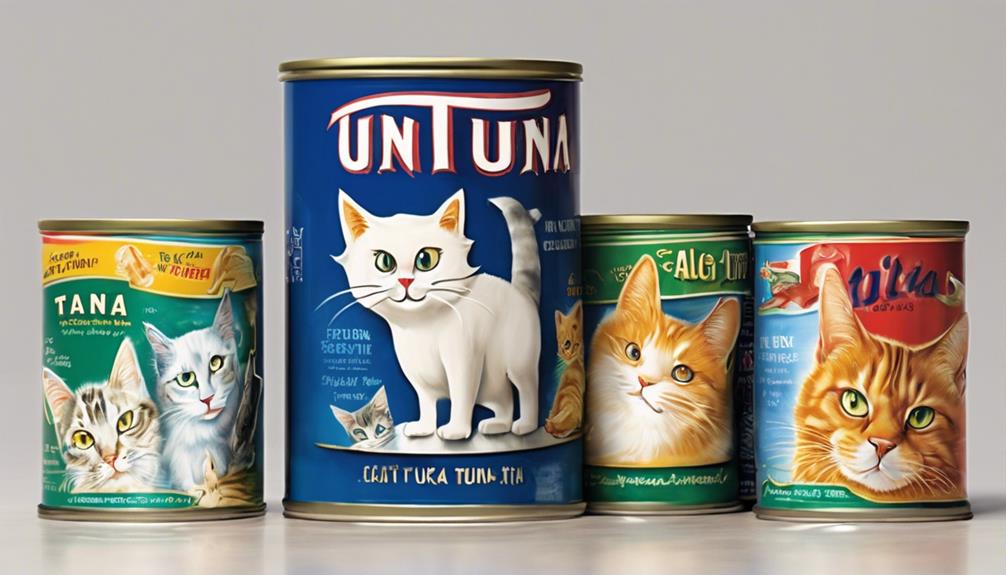
Tuna in oil can offer some nutritional value for cats, with its high protein content and omega-3 fatty acids. However, it's crucial to feed it in moderation to prevent potential health issues.
Nutritional Value for Cats
Indulging cats in tuna in oil may seem appealing, but considering its nutritional value, there are significant drawbacks to be mindful of.
While tuna in oil can be a source of protein for cats, it lacks the complete and balanced nutrition necessary for feline health. Opting for tuna in oil may not provide essential fatty acids, vitamins, and minerals vital for a cat's well-being.
Additionally, there's a risk of heavy metal contamination in tuna, which can be harmful to cats if consumed regularly.
To ensure your feline friend receives a safe and balanced diet, it's advisable to choose cat food specifically formulated to meet their nutritional needs rather than relying on tuna in oil as a primary source of nutrition.
Omega-3 Benefits
Considering the numerous benefits of Omega-3 fatty acids found in tuna oil, cats can experience improved heart health, reduced inflammation, enhanced joint health, and overall well-being.
These essential fatty acids not only support a healthy heart but also help in reducing inflammation, which is beneficial for cats, especially those with joint issues.
Additionally, Omega-3 can contribute to healthier skin and a shiny coat. The cognitive function of cats may also benefit from these fatty acids, promoting overall wellness.
However, it's crucial to remember that tuna in oil has a high-calorie content, so moderation is key to prevent weight-related issues.
Moderation Is Key
With the numerous benefits that Omega-3 fatty acids from tuna oil offer to cats, it's important to remember that moderation is key for ensuring their well-being and preventing any potential health issues.
Tuna in oil contains healthy fats that can promote skin and coat health in cats when given in controlled amounts.
While cats may find tuna in oil to be a special treat due to its taste, excessive consumption can lead to weight gain and digestive issues.
Monitoring the portion sizes and frequency of tuna in oil is crucial to prevent any potential health problems from arising.
Safe Amount of Tuna in Oil

When it comes to feeding your cat tuna in oil, it's crucial to be mindful of the amount they consume.
Too much tuna in oil can lead to weight gain and digestive issues in cats.
It's important to remember that moderation is key when offering tuna in oil to your feline friend.
Tuna Oil Consumption
Consuming tuna in oil poses potential health risks for cats due to its high calorie and fat content, making it advisable to limit their intake of this particular type of tuna. To ensure your feline friend stays healthy, it's best to opt for tuna in water or fresh tuna as safer alternatives. Here is a helpful table outlining the risks associated with tuna in oil for cats:
| Potential Risks | Effects on Cats |
|---|---|
| High Calorie Content | Weight Gain |
| Potential Digestive Issues | Gastrointestinal Upset |
| High Fat Content | Pancreatitis |
| Excessive Consumption | Health Problems |
Keeping your cat's diet in check can prevent these issues and promote their well-being. Remember, moderation is key when it comes to treating your beloved pet!
Health Risks Involved
Opting for tuna in oil as a dietary choice for cats presents significant health risks due to its high calorie and fat content. The rich oil content in tuna can lead to digestive issues and gastrointestinal upset in our feline friends.
Additionally, the high fat content in tuna oil can contribute to weight gain, obesity, and even pancreatitis in cats. It's essential to be mindful of the potential health risks associated with feeding tuna in oil to our beloved pets.
To ensure their well-being, opting for tuna in water or fresh tuna is a safer choice. Let's prioritize our cats' health by making informed decisions about their diet to prevent any adverse effects that could arise from the consumption of tuna in oil.
Raw Tuna Vs. Tuna in Oil

Comparing raw tuna to tuna in oil reveals significant differences in nutritional value and potential impact on a cat's digestion. When it comes to canned tuna, especially tuna in oil, it's crucial to consider the high calorie content and the risk of digestive issues it poses for our feline friends.
Cats, being obligate carnivores, may find it challenging to digest the added oil present in tuna in oil. This can lead to gastrointestinal upset and potential health complications due to the high fat content. Moreover, tuna in oil is less hydrating for cats compared to tuna in water, which could further exacerbate digestive problems.
Therefore, opting for tuna in water is undeniably the safer choice to safeguard your cat's health and well-being. By choosing the right type of tuna for your cat, you can ensure they enjoy their treat without facing unnecessary risks to their digestive system.
Health Implications of Tuna in Oil
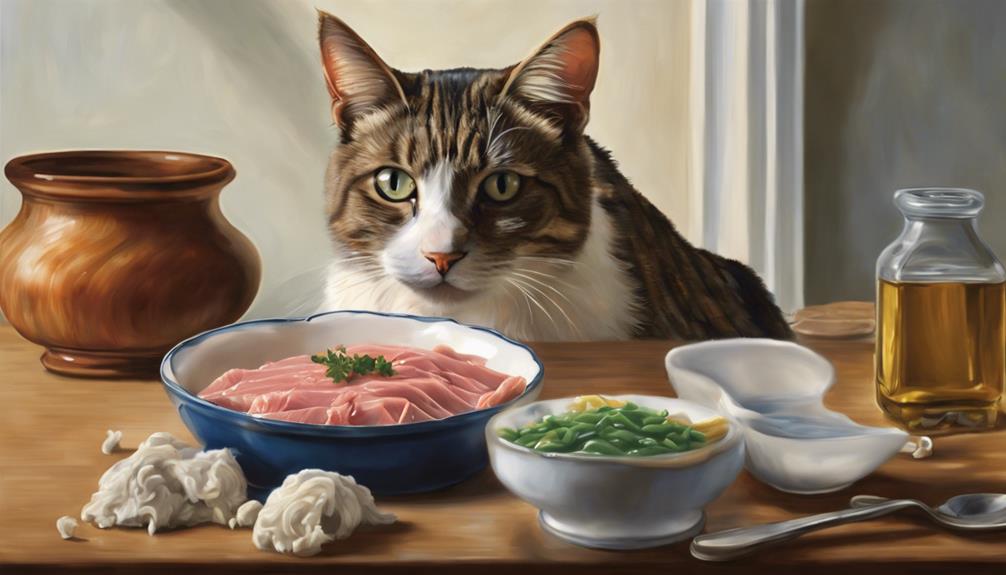
In considering the health implications of tuna in oil for cats, one must be wary of the high fat content that can lead to digestive issues. The excessive fat in tuna in oil can contribute to obesity in cats, posing various health risks.
Cats may experience gastrointestinal upset and even pancreatitis from consuming tuna in oil due to the added oil content. It's crucial to note the calorie content and fat content in tuna in oil, as they can have detrimental effects on a cat's well-being.
Opting for tuna in water or fresh tuna is a safer choice to avoid these potential health issues associated with tuna in oil. By being mindful of the risks posed by the high fat content in tuna in oil, one can help safeguard their feline companions from experiencing digestive problems and other related health concerns.
Guidelines for Serving Tuna in Oil

Considering the potential health risks associated with tuna in oil for cats, it's important to establish clear guidelines for serving this type of tuna to ensure the well-being of our feline companions.
When it comes to feeding tuna to cats, opt for specifically formulated cat food with tuna that's low in carbohydrates and has health benefits. If you choose to offer tuna in oil, do so in small amounts to minimize the risks of feeding high sodium content to your cat. Always remember that the high-fat content in tuna oil can lead to obesity and pancreatitis in cats, so it's crucial to be cautious.
To maintain your cat's digestive health, it's recommended to avoid tuna in oil altogether and instead go for tuna in water. By following these guidelines and being mindful of the potential risks, you can ensure that your furry friend enjoys tuna safely while reaping its nutritional benefits.
Age Considerations for Tuna Consumption
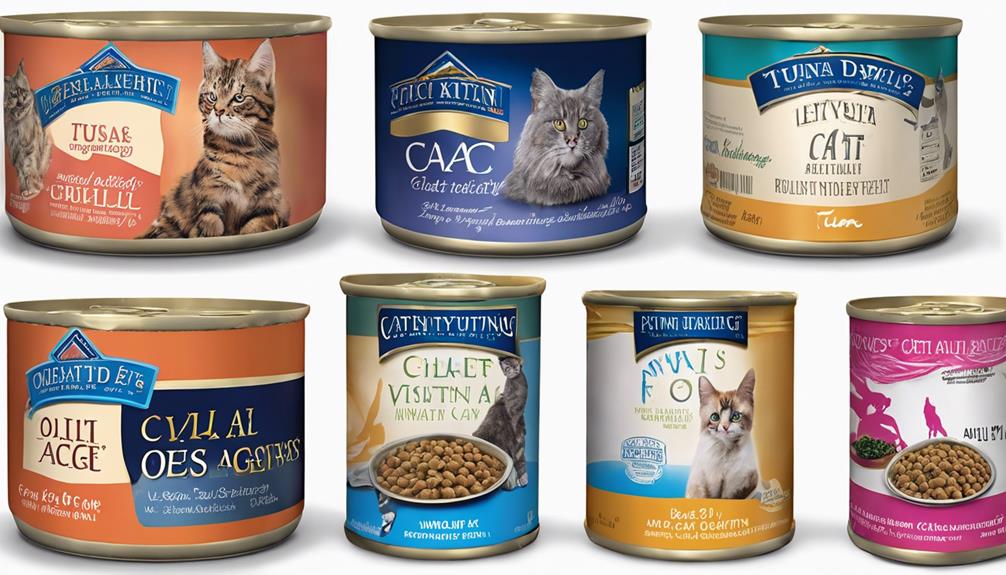
When discussing the age considerations for tuna consumption in cats, it's essential to prioritize their developmental stage and dietary needs. Kittens aged 6 to 10 weeks can enjoy a small amount of neat canned tuna as an occasional treat. However, because young kittens' bodies are more sensitive, caution is advised when introducing tuna into their diet.
While it's okay to feed your cat tuna at a young age, it shouldn't replace their primary source of nutrition, which should come from balanced kitten food. When choosing tuna for your feline friend, opt for 100% pure chunk light tuna in water to ensure safe consumption. This type of tuna minimizes the risk of mercury poisoning, which can be harmful to your cat's health.
As responsible cat parents, it's crucial to be mindful of the types of tuna we include in our cat's diet to support their overall well-being and growth.
Frequently Asked Questions
Can I Give My Cat Canned Tuna in Oil?
We recommend avoiding canned tuna in oil for cats. It's best to opt for tuna in water to prevent digestive issues and weight gain. High calorie content in oil can lead to health problems. Let's keep our feline friends safe and healthy!
What Is the Best Canned Tuna for Cats?
We love sharing that the best canned tuna for our feline friends is chunk light tuna in water without additives. It keeps them happy and healthy. Remember, always opt for no preservatives or salt for their well-being.
How Much Canned Tuna Is Safe for Cats?
Eating canned tuna in moderation is safe for cats. Too much can lead to health issues. We recommend canned tuna in water for our feline friends. Let's prioritize their well-being by offering a balanced diet.
Is Tuna in Oil Good for Cats With Constipation?
When looking at cats with constipation, tuna in oil isn't the best choice due to its high fat content, which can aggravate digestive issues. Opting for tuna in water is a safer alternative for hydration.
Conclusion
In conclusion, while cats can safely enjoy tuna in oil in moderation, it's important to consider the risks and benefits. Remember, too much of a good thing can lead to health issues for your feline friend. So, keep those tuna treats limited to maintain a balanced diet.
After all, we wouldn't want our cats to start swimming in oil themselves! Stay informed, stay cautious, and keep those kitty treats in check.
Paul’s love for animals knows no bounds. As a dedicated writer and animal lover, Paul brings a unique perspective to our team. His firsthand experiences with various animals enrich our content and provide valuable insights into their behavior and needs. Whether he’s sharing tips for pet care or shedding light on pressing conservation issues, Paul’s passion for animals shines through in everything he does.
Cats
Famous Female Cats in Movies: Top 10
Yearning for a glimpse into the world of iconic female cats in movies?
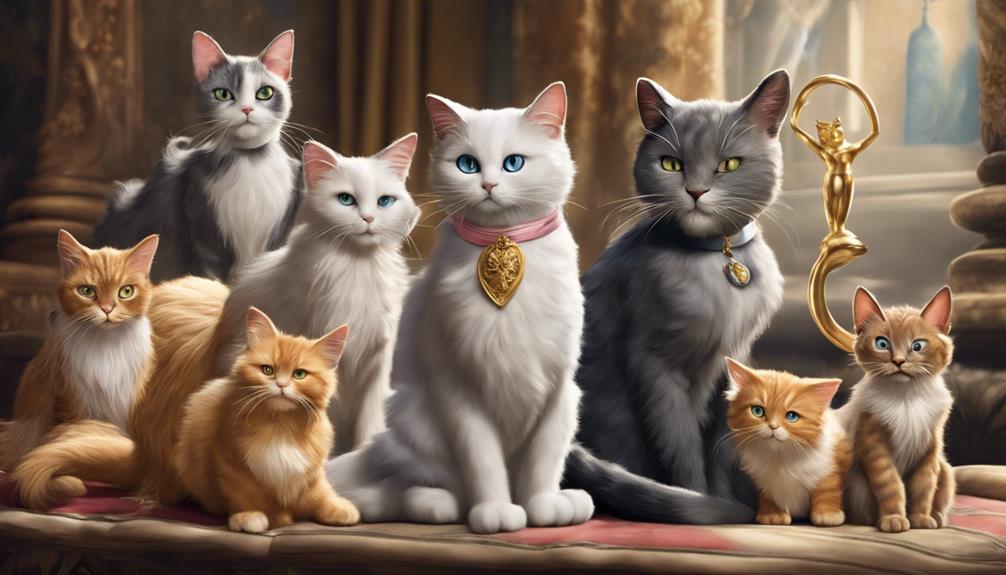
In the realm of movies, iconic female cats have captivated audiences with their memorable roles. From Holly Golightly's Cat in "Breakfast at Tiffany's" symbolizing companionship to Church bringing sinister vibes in "Pet Sematary," these feline characters steal the show. Jonesy in "Alien" provides comfort in a sci-fi horror setting, while Goose shines in "Captain Marvel" with adorableness and plot importance. Films like "The Adventures of Milo and Otis" and "Harry Potter" also feature beloved cat characters worth mentioning. Each of these famous female cats brings a unique charm to their respective films, adding depth and entertainment.
Key Takeaways
- Holly Golightly's Cat from "Breakfast at Tiffany's" is an iconic feline character symbolizing companionship.
- Church from "Pet Sematary" is a dark and transformative cat with sinister consequences in the narrative.
- Jonesy from "Alien" provides comfort and hope amid extraterrestrial danger, becoming a symbol of humanity.
- Milo and Otis from "The Adventures of Milo and Otis" showcase the escapades and talents of animal actors.
- Goose from "Captain Marvel" steals the spotlight with adorable appearance, crucial plot role, and unique origin from comics.
Breakfast at Tiffanys (1961)
In 'Breakfast at Tiffany's' (1961), we meet Holly Golightly, a flighty and cat-obsessed character who shares a special bond with her ginger tabby named Cat.
Cat, the feline companion of Holly Golightly, isn't just any ordinary cat in the movie but a symbol of companionship and attachment. Holly affectionately refers to Cat as her 'poor slob without a name,' showcasing her deep connection to the ginger tabby.
Throughout the film, the relationship between Holly Golightly and Cat highlights themes of love, freedom, and the search for identity. Cat's presence not only adds warmth and humor to the storyline but also reflects Holly's own feelings of isolation and longing for connection.
As we follow the adventures of Holly and Cat in 'Breakfast at Tiffany's,' we're drawn into a world where love knows no bounds, even between a quirky socialite and her beloved ginger tabby.
Pet Sematary (1989 and 2019)
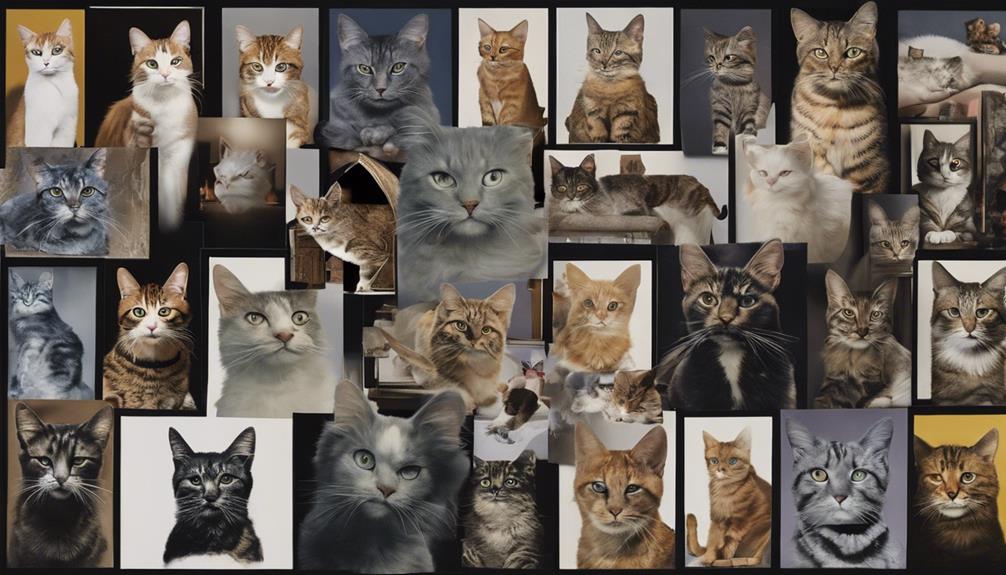
Church, the iconic feline character in both the original 1989 movie and the 2019 remake of Pet Sematary, embodies loyalty and eeriness as it undergoes a dark transformation after burial in the mysterious graveyard.
In the 2019 adaptation, four different cats were employed to bring Church to life, emphasizing the significance of this feline actor in the narrative. Church's presence in both versions of Pet Sematary adds a chilling and supernatural element to the story, captivating audiences with its haunting portrayal.
The cat character of Church serves as a poignant reminder of the sinister consequences that arise when the natural order of life and death is disrupted. Through its unsettling transformation, Church becomes a symbol of dread, leaving a lasting impression on viewers.
Pet Sematary continues to stand out in the realm of horror movies, largely due to the captivating performance of Church, the enigmatic and unsettling feline at the heart of the tale.
Alien (1979)
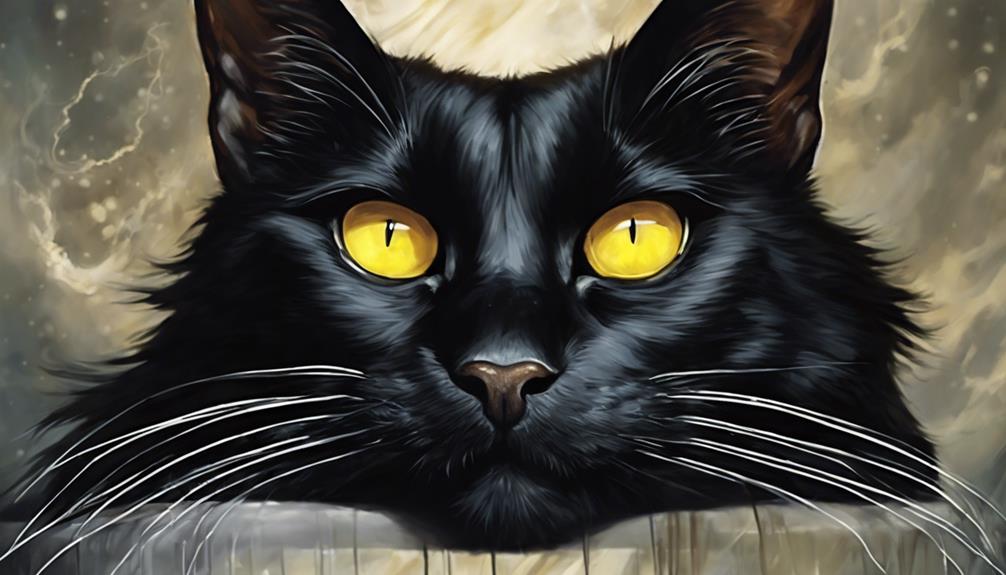
In the movie Alien (1979), Jonesy the ginger cat becomes an iconic character, influencing memorable movie moments.
Jonesy's presence not only provides comfort to the crew but also showcases the bond between humans and animals in the face of extraterrestrial danger.
The cat's role adds a unique and endearing aspect to the sci-fi horror film.
Iconic Alien Character
How did Jonesy, the ginger cat from Alien (1979), impact the atmosphere aboard the Nostromo spaceship?
Well, let's paint you a picture:
- Picture Jonesy's soft fur gently brushing against the crew's hands, offering solace in the midst of chaos.
- Imagine the soothing purrs resonating through the dimly lit corridors, a beacon of comfort in the eerie silence.
- Visualize the crew members finding moments of respite as they interacted with Jonesy, a reminder of the world beyond the spaceship's metal walls.
- Envision the subtle wag of Jonesy's tail, a small gesture that spoke volumes about the power of companionship in the face of unknown terrors.
Jonesy's presence wasn't just that of a pet; it was a symbol of hope and humanity in a world overrun by alien nightmares.
Female Cats Influence
Among the notable female cats in movies, Jonesy from Alien (1979) stands out for her impactful role aboard the Nostromo spaceship. Jonesy, the ginger cat, provided comfort and companionship to the crew, offering a sense of normalcy amidst the terror of the alien threat. Her survival instincts and agility were crucial in aiding the crew through perilous situations.
The bond between Jonesy and Ripley highlighted the importance of human-animal connections in times of crisis. Despite being a non-speaking character, Jonesy's actions and presence significantly contributed to the film's atmosphere and dynamics. The subtle interactions between Jonesy and the crew added depth to the storyline, showcasing the importance of compassion and unity in the face of danger.
Memorable Movie Moments
One standout moment in Alien (1979) that continues to captivate audiences is the intense confrontation between Ripley and the alien in the cramped confines of the spaceship.
Ripley's heart races as she faces the sleek, otherworldly Alien in a battle of survival. The Nostromo's dimly lit corridors amplify the tension, echoing with the sound of Ripley's quickened breaths. The Alien's hisses pierce the silence, signaling imminent danger to Ripley and her crewmates. Jonesy, the loyal ginger cat, watches from a safe distance, a silent witness to the unfolding chaos, offering a sense of companionship amidst the terror.
This scene not only highlights the film's suspense but also emphasizes the importance of companionship, even in the face of unimaginable threats.
The Adventures of Milo and Otis (1989)
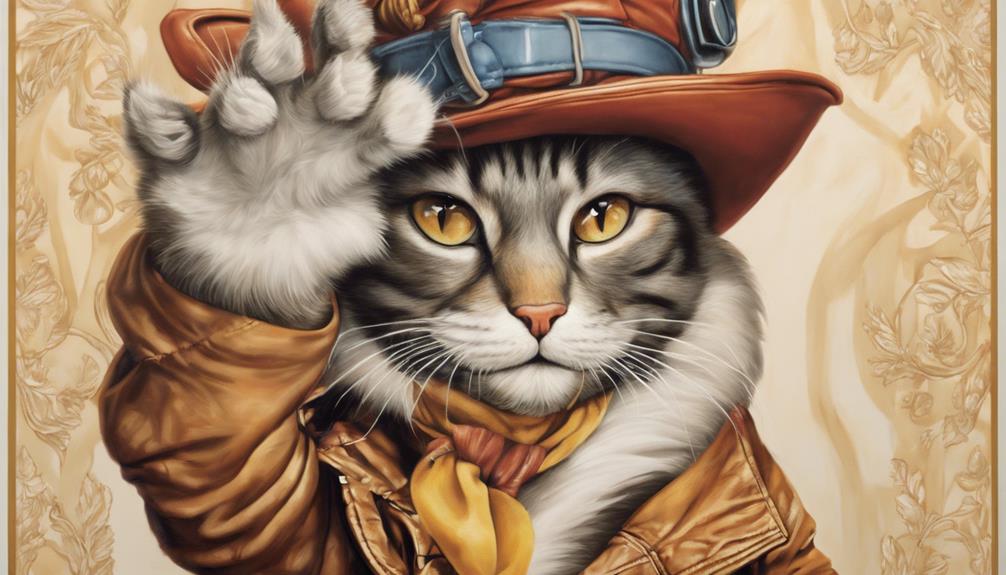
'The Adventures of Milo and Otis' (1989) follows the captivating escapades of a cat named Milo and a pug named Otis, originating from a Japanese film and gaining cult status despite controversies surrounding animal welfare during production.
This family-friendly movie showcases the incredible talent of animal actors, delivering impressive stunts and heartwarming performances that have captured the hearts of viewers over the years.
Despite facing allegations of animal cruelty, the film remains a beloved choice for animal lovers due to the endearing moments shared between Milo the cat and Otis the pug.
The movie's mix of adventure, friendship, and heartwarming scenes has solidified its place as a classic in the realm of cat movies.
Fans of animal-centric films will appreciate the genuine connection between the two main characters, making 'The Adventures of Milo and Otis' a must-watch for those seeking a wholesome and entertaining movie experience.
Captain Marvel (2019)
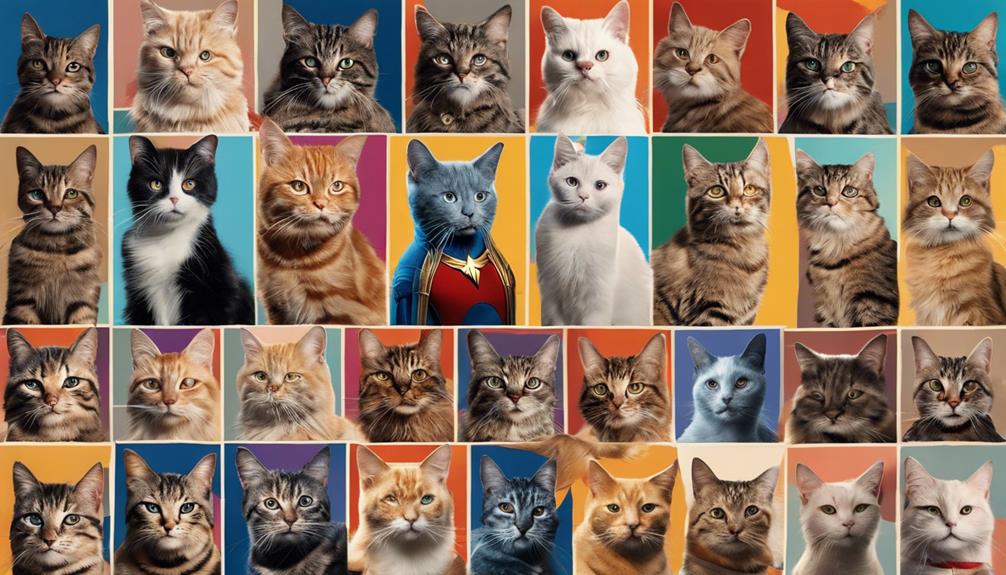
Goose steals the spotlight in Captain Marvel (2019), showcasing his adorable appearance and unexpected abilities as a Flerken.
- As a Flerken, Goose resembles an ordinary cat but possesses dangerous abilities that surprise and captivate audiences.
- Throughout the movie, Goose's actions aren't only adorable but also crucial to the plot, making him a beloved character among fans.
- The character of Goose is actually based on Chewie from the Captain Marvel comics, with some unique modifications that add depth to his role.
- Goose's presence in the film extends beyond just being a cute pet; he plays a significant part in key moments, solidifying his importance in the storyline.
Fans have embraced Goose with open arms, leading to merchandise and widespread popularity within the Marvel Cinematic Universe. His charm and unexpected nature make him a standout character in Captain Marvel, adding a delightful twist to the superhero narrative.
The Princess Diaries (2001)

Playing a pivotal role in The Princess Diaries (2001), Fat Louie emerges as the iconic male cat known for his playful and regal demeanor alongside Mia Thermopolis. As Mia's royal companion, Fat Louie steals scenes with his charming presence, adding humor and charisma to the film. His memorable moments have made him a fan favorite, captivating audiences with his endearing antics.
Whether lounging in regal fashion or playfully engaging with Mia, Fat Louie's unique personality shines through, creating a special bond with viewers. The dynamic between Mia Thermopolis and Fat Louie showcases a heartwarming connection that adds depth to the storyline, making their interactions a delightful aspect of the movie.
With his expressive feline features and lovable antics, Fat Louie brings a touch of whimsy and joy to The Princess Diaries, solidifying his place as a beloved character in the hearts of many.
Inside Llewyn Davis (2013)
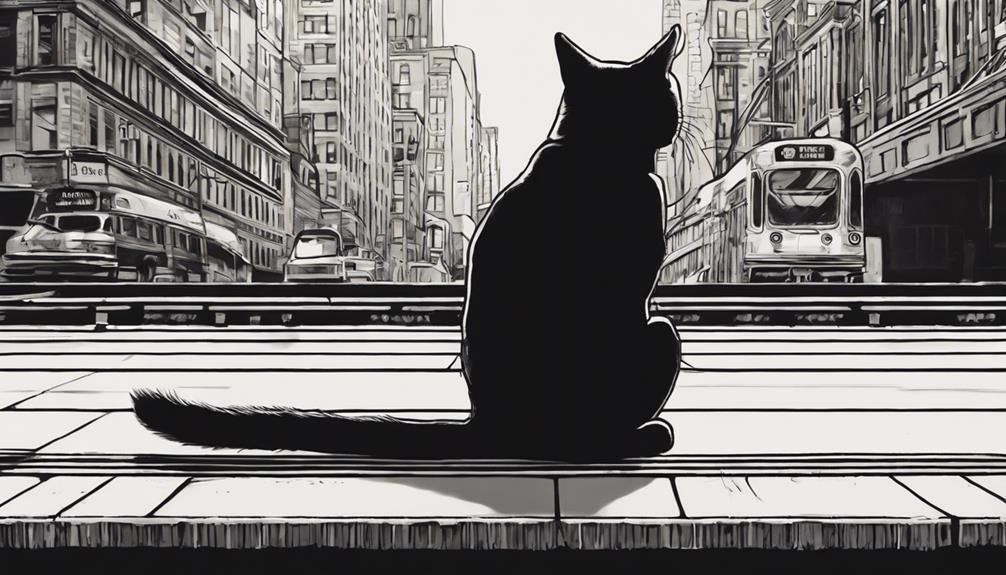
In Inside Llewyn Davis (2013), a cat named Ulysses takes on a significant role, symbolizing the struggles and journey of the film's protagonist. Ulysses, portrayed by multiple look-alike cats, seamlessly weaves through the storyline, adding depth to the relationship dynamics between characters.
Here's a glimpse into Ulysses' impact:
- Ulysses, with his enigmatic gaze, mirrors the internal turmoil of Llewyn Davis, reflecting his inner conflicts and uncertainties.
- The feline's independent nature resonates with Llewyn's own sense of isolation and longing for connection in the bustling cityscape.
- Through playful interactions with Ulysses, viewers witness moments of vulnerability and tenderness in Llewyn that are otherwise hidden beneath his tough exterior.
- Ulysses' presence acts as a silent observer, shedding light on the unspoken emotions and intricate ties that bind the characters together in this poignant tale.
The subtle yet profound role of Ulysses adds a layer of complexity to the narrative, making him an integral part of the emotional tapestry within Inside Llewyn Davis.
Kikis Delivery Service (1989)

In 'Kiki's Delivery Service' (1989), Kiki's magical flying broom steals the show, but let's not forget about Jiji, the sassy cat who adds humor and sass to the storyline.
The dynamic between Kiki and Jiji showcases a bond that goes beyond words, highlighting the importance of companionship in the magical world they navigate together.
Jiji's witty and supportive nature complements Kiki's journey, making them a memorable duo in this heartwarming tale.
Kikis Magical Flying Broom
Kiki's magical flying broom in 'Kiki's Delivery Service' (1989) serves as a vital tool for the young witch's journey of self-discovery and growth, enabling her to navigate the skies with independence and determination.
- As Kiki zooms through the clouds on her broom, the wind tousles her hair, emphasizing her freedom.
- The broom's sleek design reflects Kiki's elegance and grace as she soars above the picturesque landscapes.
- With each delivery she makes on her broom, Kiki gains confidence in her abilities and strengthens her sense of self.
- The broom's enchanting flight symbolizes Kiki's transition from uncertainty to embracing her magical heritage and purpose.
Kiki's magical flying broom not only aids her in her deliveries but also acts as a metaphor for her personal journey towards maturity and self-realization.
Jiji the Sassy Cat
Jiji the sassy black cat, known for his witty remarks and loyal companionship to Kiki, plays a significant role in the animated film 'Kiki's Delivery Service' (1989). Voiced by the talented Phil Hartman in the English dub, Jiji's humorous banter with Kiki adds depth and humor to the story.
Throughout the movie, Jiji helps Kiki adapt to her new surroundings and supports her in her delivery service endeavors. His charming personality and strong bond with Kiki make him a standout character, showcasing the importance of animal companionship and friendship.
Jiji's presence not only provides comedic relief but also underscores the theme of loyalty and support. In the world of animated films, Jiji has become an iconic and beloved feline figure, cherished for his role in Kiki's journey.
Harry Potter Series

Half-Kneazle Crookshanks, Hermione's loyal and intelligent cat in the Harry Potter series, plays a crucial role in exposing Peter Pettigrew's true identity in the Prisoner of Azkaban. Crookshanks' distinctive appearance with bushy fur, squashed face, and piercing amber eyes adds to his mysterious charm.
Here are some fascinating facts about Crookshanks:
- Sharp Intelligence: Crookshanks is known for his exceptional intelligence, which aids Hermione and the gang in solving intricate mysteries.
- Loyalty to Hermione: Crookshanks displays unwavering loyalty to Hermione, supporting her through thick and thin in their magical adventures.
- Pottermore Mention: J.K. Rowling herself highlighted Crookshanks' significance in aiding Sirius Black during the tumultuous events of the Prisoner of Azkaban.
- Instrumental Role: Beyond being a mere pet, Crookshanks proves to be an instrumental character in the series by helping unveil the true intentions of Peter Pettigrew, ultimately changing the course of events in the wizarding world.
Homeward Bound: The Incredible Journey (1993)

Sassy, the determined and loyal feline from Homeward Bound: The Incredible Journey (1993), joins two dogs on a cross-country adventure in search of their family.
Voiced by Sally Field, Sassy's character brings humor and excitement to the heartwarming journey.
Her resourcefulness and interactions with the dogs make her a beloved and memorable part of the film.
Top Female Cat Characters
Embarking on a cross-country journey with two dogs, the tenacious and adventurous female cat in 'Homeward Bound: The Incredible Journey' (1993) adds a unique charm to the heartwarming animal adventure. Voiced by Sally Field, Sassy's determination and courage make her a memorable character in the film. Here's why she stands out:
- Sassy fearlessly navigates through various challenges, showcasing her bravery.
- Her witty remarks and sassy attitude bring humor and liveliness to the group dynamics.
- Sassy's interactions with the dogs and other animals highlight her caring nature.
- Sally Field's vocal performance breathes life into Sassy, giving depth to the feline character's personality.
Homeward Bound Representation
Representing a tale of friendship and determination, 'Homeward Bound: The Incredible Journey (1993)' portrays the inspiring journey of Sassy, a tenacious cat, and her loyal canine companions searching for their family across the country.
Sassy's unwavering determination and resourcefulness shine through as she overcomes obstacles alongside her canine pals. Voiced by the talented Sally Field, Sassy's character adds humor and sass to the group dynamic, making her a beloved part of this heartwarming family film.
Throughout the perilous journey, Sassy's loyalty and courage are evident, showcasing her as a standout character who embodies the spirit of resilience and companionship. This classic movie captures the essence of unity and perseverance, making Sassy a memorable feline heroine in the world of cinema.
Frequently Asked Questions
Who Is the Most Famous Fictional Cat?
We believe the most famous fictional cat is Garfield. Created in 1978 by Jim Davis, Garfield's known for loving lasagne, hating Mondays, and delivering witty sarcasm. Appearing in comics, TV, and movies, Garfield's an enduring cultural icon.
What Is the Most Famous Cat in Hollywood?
We believe the most famous cat in Hollywood is Jonesy from 'Alien' (1979). Jonesy, an orange tabby, brings comfort and tension in the sci-fi horror film. His loyalty and unpredictability make him iconic, enhancing the storyline.
Who Is the Famous Crazy Cat Lady?
We know the famous crazy cat lady you're curious about. She's an iconic character, deeply entwined with feline companions. Her eccentricity and love for cats captivate us all. Let's uncover her intriguing story together.
Who Is the Most Famous Cat of All Time?
We believe the most famous cat of all time would be Garfield. He's iconic for his love of lasagne and disdain for Mondays, charming audiences with his wit and humor in movies, TV shows, and comics.
Conclusion
In the world of movies, female cats have left a lasting paw print on our hearts. From the iconic Holly Golightly's feline companion in 'Breakfast at Tiffany's' to the mysterious Jonesy in 'Alien,' these purr-fect stars have stolen the show.
Just like cats have nine lives, these famous feline characters have brought joy and entertainment to audiences of all ages. Their whiskers may be fictional, but their impact is very real.
Paul’s love for animals knows no bounds. As a dedicated writer and animal lover, Paul brings a unique perspective to our team. His firsthand experiences with various animals enrich our content and provide valuable insights into their behavior and needs. Whether he’s sharing tips for pet care or shedding light on pressing conservation issues, Paul’s passion for animals shines through in everything he does.
-
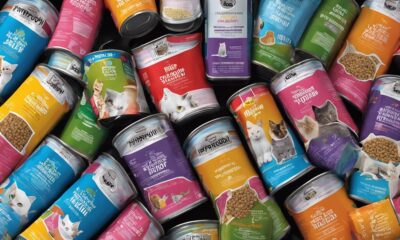
 Vetted2 months ago
Vetted2 months ago15 Best Cat Foods for Managing Hyperthyroidism – Vet Approved and Feline Friendly
-
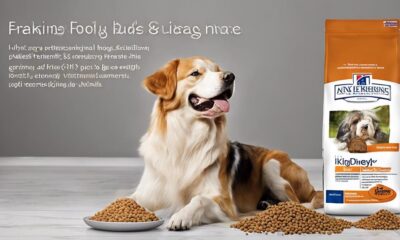
 Vetted2 months ago
Vetted2 months ago15 Best Dog Foods for Kidney Disease – Expert Recommendations for Your Pet's Health
-
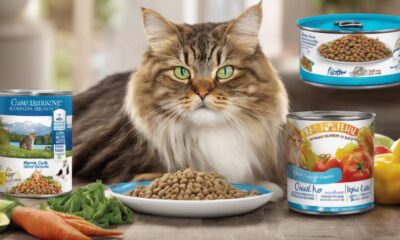
 Vetted2 months ago
Vetted2 months ago15 Best Wet Cat Foods for Older Cats to Keep Them Healthy and Happy
-

 Vetted2 months ago
Vetted2 months ago15 Best Fresh Dog Food Delivery Services for Your Pup's Health and Happiness
-

 Vetted2 months ago
Vetted2 months ago14 Best Homemade Dog Food Recipes Your Pup Will Love – Vet Approved & Nutritious
-

 Animal Facts2 months ago
Animal Facts2 months agoSpring Animals: A Guide to Seasonal Wildlife
-
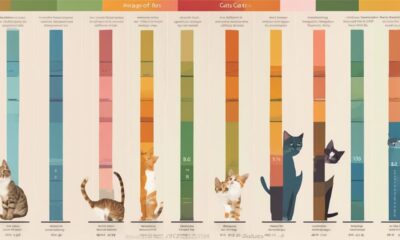
 Cats1 month ago
Cats1 month agoCat Weight Chart by Age: Kitten to Senior in Lbs
-

 Cats2 weeks ago
Cats2 weeks agoTop 5 Cat Breeders in Arkansas: A Guide




















